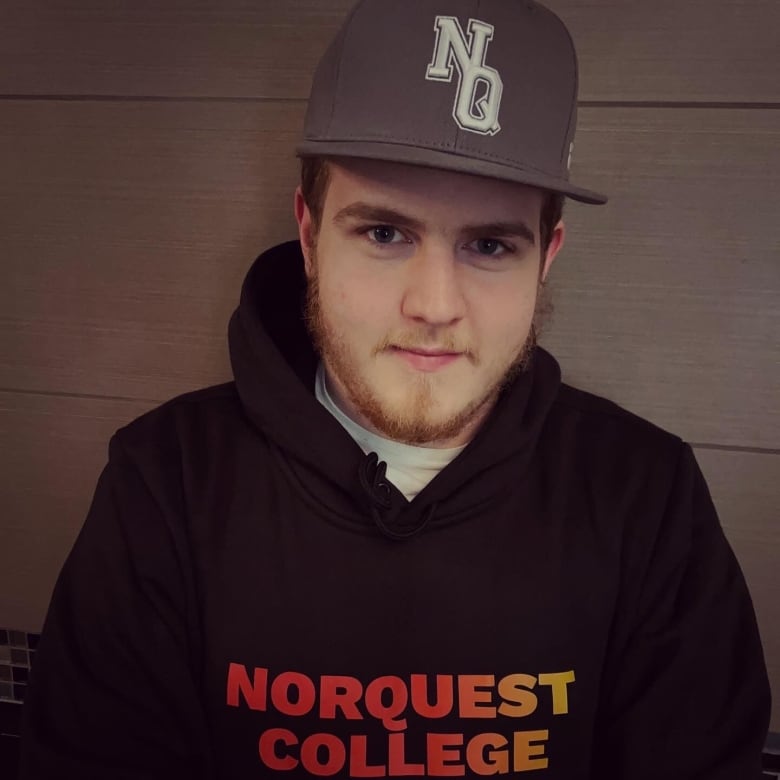Alberta student job programs canceled by government funding cuts | CBC News
Edmonton’s NorQuest College says programs and classes have been canceled for hundreds of students in September due to cuts in state funding for jobs.
Among the canceled programs is Edmonton’s year-round experience for youth with developmental disabilities to prepare them for work and provide work experience.
“It was like a silly program,” said Janis Liston, whose 19-year-old son Gage was enrolled in the NorQuest commuter program.
Gage is on the autism spectrum and has attention deficit hyperactivity disorder (ADHD). Postsecondary opportunities for young adults with developmental disabilities are scarce, Liston said.
He learned about the program in early 2023, and Gage applied last year. He was so excited about going to college, making friends, learning how to talk and resume writing skills and completing work, he had already bought a swag with the name of the college.
Liston said the family’s joy turned to fear and anger last week when unexpected budget cuts prompted NorQuest to cancel four programs.
“I honestly thought we were joking,” Liston said.
The changes to Employment were phased out in Edmonton, but will still apply in Wetaskiwin, says Melissa Rothwell, program manager of the new education program in the department of skills and basic education. He said 24 students with developmental disabilities were affected.
Also canceled is the daycare provider program, where 16 incoming students — mostly immigrant women of color — will learn skills to open new childcare options, she said.
Rothwell said the college also had to reduce space and courses in its academic enrichment program, where seniors complete high school credits, and English-as-a-second training.
He did not have an exact number, but he said that hundreds of students who were scheduled to start classes were being expelled.
“It’s sad to tell people who already have barriers that may not be able to go to secondary school and contribute to Alberta’s economy,” he said in an interview Friday. “That they expected to be trained or get an education to be able to break down some of the barriers they faced was a disservice to everyone involved.”
The majority of college-educating students are women, and one in six are Indigenous.
ESL students are new Canadians and permanent residents who are improving their language skills to attend school or find work.
Labor finance debate
The Alberta government says the root of the funding crisis is the federal government’s decision to freeze labor market transfer agreements (LMTAs), which help fund jobs programs across the country.
The higher payments started in 2017, and in 2023, the federal government told the provinces that the increase would stop for a year.
In an emailed statement last week, Alberta Jobs, Employment and Business Minister Matt Jones said the top priority was to buy time to address income inequality across the country, and the work is not done yet. Jones said Alberta received less per capita income in 2024-25 than the Canadian average.
Jones’ statement called for the federal government to reverse the “irresponsible decision.”
Funding to Alberta this year is down about $71 million to $251 million.
The cuts affected provincial programs in many sectors. The labor ministry suspended its Canada-Alberta Job Grant program, and all other programs are under review, Jones’ press secretary said.
Advanced Education Minister Rajan Sawhney said in an emailed statement that federal funding cuts have also put the province’s basic education grant program at risk.
The provincial program, which had budgeted about $117 million this year, helps students who need to pay for housing, tuition, books, supplies, transportation or childcare while they enroll. full time in a refresher or refresher program. State reports say more than 8,400 students received scholarships last year.
“We are currently evaluating options to respond to this cut of federal funding. No decisions have been made at this time,” said Sawhney’s statement.
Mathis Denis, press secretary for Randy Boissonnault, the federal minister of employment, workforce development and official languages, said in an email last week that the provinces were aware of, and should have planned, the financial changes. .
He said they can expect more federal revenue through capital gains tax changes.
“Alberta put in an extra $4 billion last year; it’s a shame they aren’t willing to help Alberta workers,” Denis wrote.
The changes left the post-secondary community in disarray
At the center of the controversy are universities, colleges, and other organizations that run programs that prepare people for work and career transitions.
Sudden cuts to the FLAP budget influenced NorQuest’s decisions, Rothwell said.
In July, the province notified NorQuest of an “unexpected reduction” in funding, he said.
The results for other centers are less clear. CBC News contacted five stations that offer similar programs.
A spokesperson for Mount Royal University said there are no immediate plans to reduce participation by students using FLAP funds.
Other organizations did not respond by press time.

Now looking to get more options are Gage Liston, and 20-year-old Moses Melnyk, who was also signed up to start a career transition program at NorQuest.
“This is one of the few programs that will help him,” Moshe’s father Ron Melnyk said in an interview. “It’s not guaranteed, but it will give him the best chance of getting a job. And getting a job is having a purpose.”
When Moshe learned that the first student was being trained to operate a forklift, he was happy, his father said. He wants to get his driver’s license, work as a utility or truck driver, and live alone, Ron Melnyk said.
When the show was canceled, Ron Melnyk said his son became angry and hopeless.
“This is a program that doesn’t need to be cut,” Ron Melnyk said. “This is something that benefits the whole community.”
#Alberta #student #job #programs #canceled #government #funding #cuts #CBC #News

